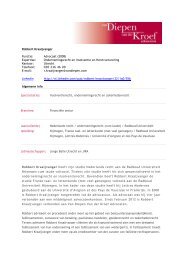© Van Diepen Van der Kroef Advocaten
© Van Diepen Van der Kroef Advocaten
© Van Diepen Van der Kroef Advocaten
- No tags were found...
You also want an ePaper? Increase the reach of your titles
YUMPU automatically turns print PDFs into web optimized ePapers that Google loves.
199. The European Court of Justice on 3 September 2008 pronounced a judgment, which is animportant judgment for the present case, on the relationship between UN Resolutions andthe fundamental rights arising un<strong>der</strong> the EU Treaty, including thereun<strong>der</strong> Article 6 ECHR.The Association et al. will address this judgment at some length. The Association et al. willaddress in sequence the facts, the Advisory Opinion of the Advocate-General and thedecision of the Court at second instance. Stated briefly, the judgment entails first that thecommunity legal or<strong>der</strong> is separate from obligations un<strong>der</strong> international treaties, includingUN treaties and rules. Secondly, the judgment entails that Member States of the EuropeanUnion and its organs must review in respect of the fulfilment of international obligationswhether the basic rights of the citizens arising un<strong>der</strong> the EU Treaty are safeguarded. Thatdemonstrates the incorrectness of the reasoning of the District Court.Facts200. The facts in the Case Kadi and Al-Barakaat (Court of Justice, dated 3 September 2008, CaseC-415/05 P, Al Barakaat International Foundation against Council of the European Union andCommission of the European Communities) are briefly given below.201. The Sanctions Committee of the Security Council of the United Nations designated Kadi andAl-Barakaat International Foundation as persons suspected of supporting terrorism, as aresult of which their funds and other financial resources were frozen. Kadi and Al-Barakatchallenged the legality of the or<strong>der</strong>, whereupon the Council implemented the or<strong>der</strong> tofreeze all property within the European Community. Kadi and Al-Barakaat argued, inter alia,that despite the intended aim of combatting international terrorism and the purpose of theUnited Nations to secure peace and security, the contested regulation violated a number offundamental rights. The Council and the European Commission adopted the position that theregulation was necessary for the implementation of binding resolutions of the SecurityCouncil and that accordingly the European Community judicature should refrain fromsubjecting this regulation to review for compatibility with fundamental rights. In effect,they asserted that when the Security Council spoke, the court should keep quiet.202. The State of the Netherlands intervened in the proceedings on the side of the Council andEuropean Commission. The State of the Netherlands argued before the Court of Justice thata resolution adopted by the Security Council,’ in principle escapes all review by theCommunity judicature, even concerning observance of fundamental rights, and so for that<strong>©</strong> <strong>Van</strong> <strong>Diepen</strong> <strong>Van</strong> <strong>der</strong> <strong>Kroef</strong> <strong>Advocaten</strong> page 85 of 99
















